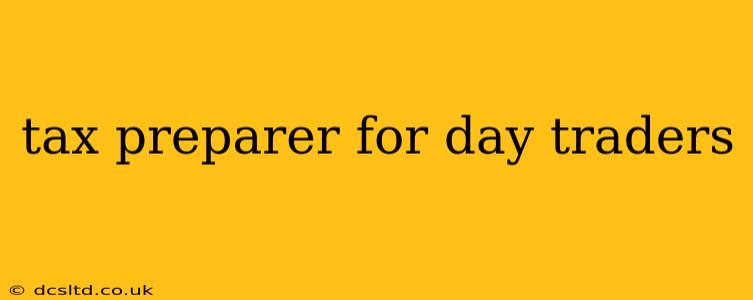Day trading, the practice of buying and selling financial instruments within the same trading day, presents unique tax challenges. Unlike long-term investors, day traders often face significantly more complex tax situations requiring specialized knowledge and expertise. Finding the right tax preparer is crucial for accurate reporting and minimizing tax liabilities. This guide will help you understand the nuances of day trading taxes and what to look for in a qualified tax professional.
What Makes Day Trading Taxes Different?
The primary difference lies in the classification of your trading activities. While long-term investments are often taxed at lower capital gains rates, day trading profits are typically taxed as ordinary income, subject to your individual income tax bracket. This can significantly impact your overall tax liability. Furthermore, meticulous record-keeping is paramount. Day traders need to track every trade, including the date, purchase price, sale price, commissions, and fees, to accurately calculate their gains and losses. The sheer volume of transactions adds a layer of complexity not found in traditional investment strategies.
What to Look for in a Tax Preparer for Day Traders?
Finding a tax preparer experienced in handling the complexities of day trading is vital. Here's what you should seek:
-
Specific Day Trading Experience: Don't settle for a generalist. Look for a preparer who explicitly states their expertise in day trading tax preparation. This indicates they understand the unique aspects of your trading activities, such as wash-sale rules, Section 1256 contracts, and the intricacies of reporting various types of financial instruments.
-
Knowledge of Tax Software: A proficient tax preparer will utilize specialized tax software designed to handle the high volume of transactions involved in day trading. This ensures accurate calculations and minimizes the risk of errors.
-
Understanding of Different Asset Classes: Day traders may deal with stocks, options, futures, forex, and cryptocurrencies. Ensure your preparer is familiar with the tax implications of each.
-
Proactive Approach: A good preparer will not just passively fill out forms. They'll actively look for ways to legitimately minimize your tax burden, within the bounds of the law, through deductions and strategies applicable to your specific trading activities.
-
Professional Credentials and References: Look for designations like Enrolled Agent (EA), Certified Public Accountant (CPA), or other relevant professional certifications. Check for client testimonials and reviews to gauge their reputation and client satisfaction.
What Records Do I Need to Provide My Tax Preparer?
Your tax preparer will require detailed records of all your trading activity. This typically includes:
-
Brokerage Statements: Comprehensive statements detailing every transaction, including buy and sell orders, commissions, fees, and dividends.
-
Trade Confirmations: Individual confirmations for each trade executed.
-
Account Statements: Monthly or quarterly statements reflecting account activity.
How Does the Wash-Sale Rule Apply to Day Traders?
H2: What is the Wash-Sale Rule?
The wash-sale rule prevents taxpayers from claiming a loss on a security if they repurchase substantially identical securities within 30 days before or after the sale. This rule applies to day traders as well, meaning that if a day trader sells a security at a loss and repurchases it within 30 days, they cannot deduct that loss on their tax return. Instead, the loss is added to the cost basis of the repurchased security.
Are Day Trading Profits Taxed as Ordinary Income?
H2: How are Day Trading Profits Taxed?
Yes, profits from day trading are generally taxed as ordinary income. This means they are taxed at your individual income tax bracket, which can be significantly higher than the capital gains tax rates applied to long-term investments. However, certain types of transactions, like Section 1256 contracts, have specific tax rules.
What are Section 1256 Contracts?
H2: What are the Tax Implications of Section 1256 Contracts?
Section 1256 contracts are marked-to-market at the end of the year. This means that any gains or losses are recognized regardless of whether the contracts are actually sold. They are taxed at a special 60/40 rate, with 60% taxed as long-term capital gains and 40% as short-term capital gains.
Conclusion: Finding the Right Partner for Tax Success
Choosing the right tax preparer is a critical step for every day trader. The complexities involved demand a professional with specific expertise in this area. By carefully considering the factors outlined above and asking the right questions, you can find a trusted advisor to help navigate the intricacies of day trading taxes and ensure you're complying with all regulations while minimizing your tax burden. Remember, proactive tax planning is key to long-term financial success.
